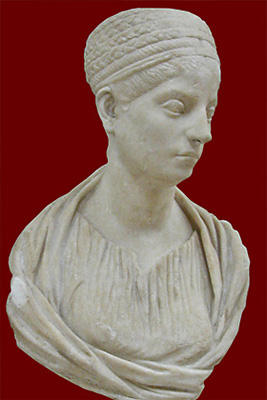
Bust of a noblewoman, 130-140 CE

Attusia Lucana Sabina was from an old Gallic family native to Burdigala (Bordeaux, France), the capital of the Roman province of Aquitania and a prosperous commercial city. Her mother’s name has not been preserved; she must have died before Sabina married, as there is no poem for her in the Parentalia, Ausonius' collection of poems honoring deceased family. Her father, Attusius Lucanus Talisius, is remembered by Ausonius (Parentalia 8 [10]) as a landowner who shunned public office; he died not long after he chose his daughter's husband, Decimus Magnus Ausonius (c. 310-393 CE), but before their marriage. Her age at marriage is unknown, but she lived to bear three children before she died at 27 years of age (before 350 CE). Ausonius, grammaticus at the local school of rhetoric, tutor of the Emperor Gratian, statesman and poet, survived his only wife as a widower for more than 40 years. Their son Ausonius died in infancy (Parentalia 10 [12]). Their second son, Decimus Hilarianus Hesperius, became a prefect in 378 CE; he married and had three children, the third of whom, a son Pastor, died young (Parentalia 11 [13]). Sabina's third child was a daughter, whose name has not been preserved; she married Valerius Latinus Euromius, who died after she bore him a child (Parentalia 14 [16]); she then married Thalassius, by whom she had two children, Censorius Magnus Ausonius and Paulinus. Sabina’s two sisters are also memorialized by Ausonius: Namia Pudentila (Parentalia 19) and Attusia Lucana Talisia (Parentalia 21).
This is the first of five epigrams (the others are Ep. 19, 27-29) that Ausonius composed about his wife Sabina, considered to have been written early in their brief marriage. It is a clever appropriation of Latin love elegy in which Ausonius exhibits his love for his wife while demonstrating his mastery of the genre. In dialogue with Catullus's invitation to Lesbia to live and love (particularly lines 1 and 11 of Carmina 5), Ausonius' poem unites in Sabina the polarities of classical love elegy: uxor and puella. For further discussion of this poem, see Sklenar's article in the Bibliography. The poem is written in elegiac couplets.
Uxor, vivamus ut viximus, et teneamus
nomina quae primo sumpsimus in thalamo,
nec ferat ulla dies ut commutemur in aevo,
quin tibi sim iuvenis tuque puella mihi.
5Nestore sim quamvis provectior aemulaque annis
vincas Cumanam tu quoque Deiphoben,
Ausonius never remarried after the death of his wife Sabina. He wrote this long lament about her nearly forty years after she died, speaking directly to his wife from line 5 to the end of the poem. While it is a testimony to the constancy of his affection, it obsesses on his suffering and continuing sorrow and reveals little about the young woman who inspired him to write the passionate love elegy above. Ausonius placed this mournful poem among those he wrote to commemorate members of his deceased family and friends, collected under the title Parentalia. He took the name of his collection from the nine-day festival (February 13-21) during which the Romans honored their ancestors with offerings of flowers (particularly violets), salt, wheat, and bread soaked in wine, at the family tomb, seeking to maintain and strengthen the protection the maiores provided their descendents. This poem is also written in elegiac meter.
Hactenus, ut caros ita iusto funere fletos
functa piis cecinit nenia nostra modis.
Nunc, dolor atque cruces nec contrectabile fulmen,
coniugis ereptae mors memoranda mihi.
5 Nobilis a proavis et origine clara senatus,
moribus usque bonis clara Sabina magis,
te iuvenis primis luxi deceptus in annis
perque novem caelebs te fleo Olympiadas.
Nec licet obductum senio sopire dolorem;
10 semper crudescit nam mihi poena recens.
Admittunt alii solacia temporis aegri:
haec graviora facit vulnera longa dies.
Torqueo deceptos ego vita caelibe canos,
quoque magis solus, hoc mage maestus ago.
15Volnus alit, quod muta domus silet et torus alget,
quod mala non cuiquam, non bona participo.
Maereo, si coniunx alii bona, maereo contra
si mala: ad exemplum tu mihi semper ades.
Tu mihi crux ab utraque venis, sive est mala, quod tu
20 dissimilis fueris, seu bona, quod similis.
Non ego opes cassas et inania gaudia plango,
sed iuvenis iuveni quod mihi rapta viro:
laeta, pudica, gravis, genus inclita et inclita forma,
et dolor atque decus coniugis Ausonii.
25Quae modo septenos quater inpletura Decembres,
liquisti natos, pignera nostra, duos.
Illa favore dei, sicut tua vota fuerunt,
florent, optatis accumulata bonis.
Et precor ut vigeant, tandemque superstite utroque,
Click on the underlined words for translation aids and commentary, which will appear in a small window. Click on the icon link
![]() to the right of the
poem for related images and information.
to the right of the
poem for related images and information.